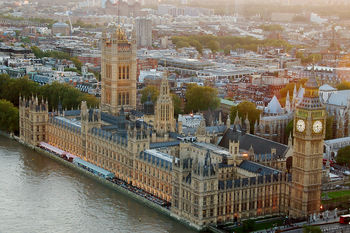Palace of Westminster: Difference between revisions
Jump to navigation
Jump to search

imported>Richard Nevell No edit summary |
imported>Richard Nevell (Add image) |
||
| Line 1: | Line 1: | ||
{{subpages}} | {{subpages}} | ||
{{Image|Westminster Palace, aerial.jpg|thumb|350px|The Palace of Westminster from above}} | |||
The '''Palace of Westminster''' was built between 1840 and 1870 and is the meeting place of the British Parliament. The present build was designed by [[Charles Barry]] and replaced an earlier palace which was destroyed in a fire of 1834.<ref>"[http://www.parliament.uk/about/living-heritage/building/palace/architecture/key-dates-fire1834-to-present/ The Palace of Westminster: Key dates], www.parliament.uk. Accessed 21 February 2013.</ref> In 1987 the Palace of Westminster along with [[Westminster Abbey]] and Saint Margaret's Church became designated a World Heritage Site by UNESCO, recognising the importance of the buildings.<ref>"[http://whc.unesco.org/en/list/426 Westminster Palace, Westminster Abbey and Saint Margaret's Church]", UNESCO. Accessed 21 February 2013.</ref> From the reign of [[Edward the Confessor]], Westminster Palace was the primary residence of the kings of England until 1512 when it was badly damaged by fire.<ref>Emery, Anthony (2006). ''Greater Medieval Houses of England and Wales, Volume III: Southern England''. Cambridge: Cambridge University Press. p. 252. ISBN 978-0-521-58132-5.</ref> | The '''Palace of Westminster''' was built between 1840 and 1870 and is the meeting place of the British Parliament. The present build was designed by [[Charles Barry]] and replaced an earlier palace which was destroyed in a fire of 1834.<ref>"[http://www.parliament.uk/about/living-heritage/building/palace/architecture/key-dates-fire1834-to-present/ The Palace of Westminster: Key dates], www.parliament.uk. Accessed 21 February 2013.</ref> In 1987 the Palace of Westminster along with [[Westminster Abbey]] and Saint Margaret's Church became designated a World Heritage Site by UNESCO, recognising the importance of the buildings.<ref>"[http://whc.unesco.org/en/list/426 Westminster Palace, Westminster Abbey and Saint Margaret's Church]", UNESCO. Accessed 21 February 2013.</ref> From the reign of [[Edward the Confessor]], Westminster Palace was the primary residence of the kings of England until 1512 when it was badly damaged by fire.<ref>Emery, Anthony (2006). ''Greater Medieval Houses of England and Wales, Volume III: Southern England''. Cambridge: Cambridge University Press. p. 252. ISBN 978-0-521-58132-5.</ref> | ||
Revision as of 15:47, 21 February 2013
The Palace of Westminster was built between 1840 and 1870 and is the meeting place of the British Parliament. The present build was designed by Charles Barry and replaced an earlier palace which was destroyed in a fire of 1834.[1] In 1987 the Palace of Westminster along with Westminster Abbey and Saint Margaret's Church became designated a World Heritage Site by UNESCO, recognising the importance of the buildings.[2] From the reign of Edward the Confessor, Westminster Palace was the primary residence of the kings of England until 1512 when it was badly damaged by fire.[3]
References
- ↑ "The Palace of Westminster: Key dates, www.parliament.uk. Accessed 21 February 2013.
- ↑ "Westminster Palace, Westminster Abbey and Saint Margaret's Church", UNESCO. Accessed 21 February 2013.
- ↑ Emery, Anthony (2006). Greater Medieval Houses of England and Wales, Volume III: Southern England. Cambridge: Cambridge University Press. p. 252. ISBN 978-0-521-58132-5.
